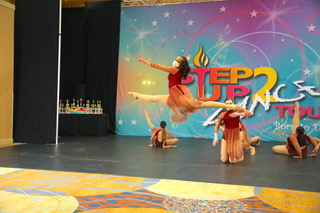The Forgotten Athletes: Balancing Coursework and Competition Without Recognition

Cecelia Ashenuga ’24 competing at Step Up 2 Dance.
Montrose athletes know how fun it is to leave class early for a competition. Not only do they get to miss part of the class, but everyone also cheers for them on their way out the door. Teachers understand that they need to leave, and everyone is incredibly supportive. The same cannot be said for athletes who compete outside of Montrose. Although everyone wishes them the best, they are often forgotten. On the days of their competitions, they often have to contend with piles of homework and missed lessons. Teachers may not be quite as understanding, and since the athlete is the only one missing class, she may need to work extra hard to catch up.
Cecilia Ashenuga ‘24 of Julianne’s Dance Workshop is one of those athletes. She often has dance competitions on the weekends. Sometimes, they are in different states and run late into the night. However, she is still expected to be on the bus bright and early, even if she got home at 10:00 the night before. She said: “After competitions, I’m exhausted. It takes forever to unpack and wash off my makeup and hair gel.” However, her teachers aren’t able to make accommodations for her because they simply aren’t aware of her out-of-school activities. She added: “Sometimes, I go to school tired, sore, and hurt after competitions, but no one knows except a few close friends. When I mention to my teachers that I dance and rock climb, they are shocked; the thought had never even crossed their minds.”
Besides the fact that teachers are unaware of athletes’ commitments and are then unable to make accommodations for them, athletes’ schedules and the Montrose schedules often clash. Cecilia mentioned that her culminating dance recitals often coincide with the finals week, which is incredibly stressful. She said: “I have to focus on finals, but I’m also constantly thinking about my recitals.” Montrose athletes generally avoid that stress; their seasons are designed to end before finals week. However, athletes outside of Montrose do not have that advantage. They have to juggle coursework and competitions without the recognition and support that Montrose athletes get.
Although Montrose cannot change out-of-school athletes’ competition schedules to make them less stressful, it can at least allow for more in-school flexibility and recognition. The Looking Glass is one way that athletes can be featured; perhaps their major competitions can also be mentioned in Common Homerooms. Once they have been recognized, their teachers will be more aware of their out-of-school commitments. Teachers can then allow for more flexibility around important competitions and performances. Montrose needs to give these out-of-school athletes the same accommodations and recognition that it gives to in-school athletes. They perform an impressive balancing act, but they should not have to; just a little flexibility can alleviate some of their stress.
Hana Shinzawa ’24, Copy Editor and Opinions Editor














